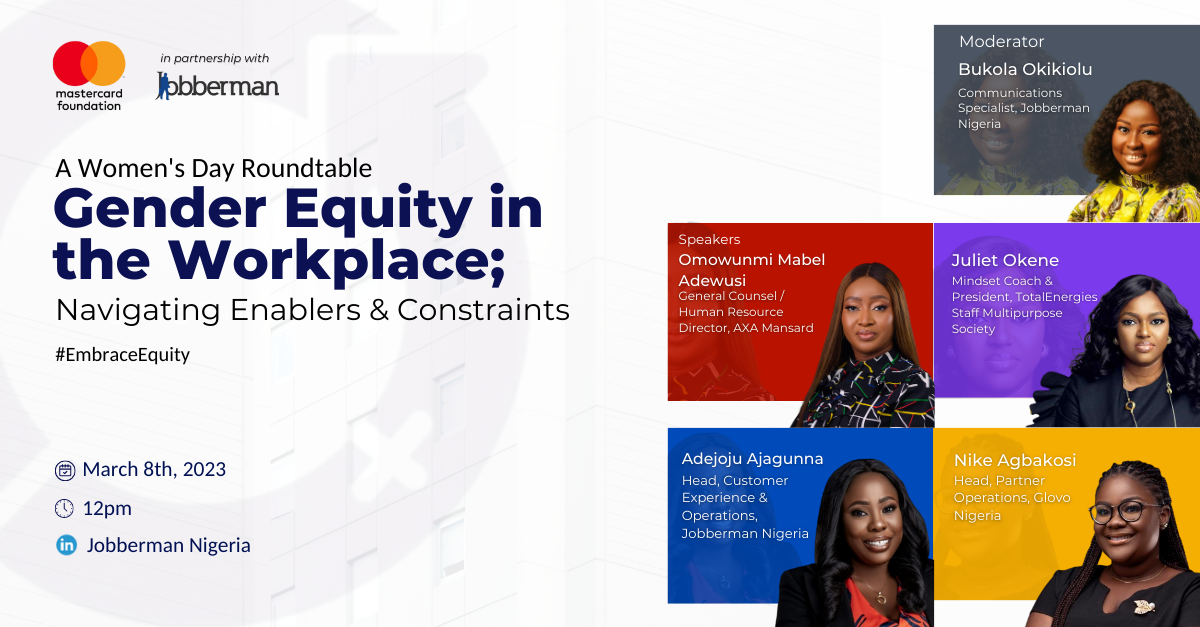The month of March is dedicated to celebrating women’s social, economic, cultural, and political achievements. March 8 of every year specifically marks a call to action for accelerating relevant themes and conversations that contribute to the continuous advancement of women in all facets of life.
This year, the focus theme is #EmbraceEquity which reminds us that gender equity in the workplace still requires our attention. Despite progress in recent years, women are still underrepresented in leadership positions and face many challenges in the workplace.
To shed light on this issue, we held a Women’s Day Roundtable themed “Gender Equity in the Workplace: Navigating Enablers & Constraints.” The event brought together a panel of experts, Including Nike Agbakosi, Head, Partner Operations, Glovo Nigeria, Omowunmi Mabel Adewusi, General Counsel/Human Resource Director, AXA Mansard, Juliet Okene, Mindset Coach & President, Total Energies Staff Multipurpose Society, and Adejoju Ajagunna, Head, Customer Experience & Operations, Jobberman Nigeria.
They shared their insights and experiences on navigating the obstacles and opportunities that impact gender equity in the workplace.
One of the main takeaways from the event was the importance of having gender-inclusive policies in the workplace. Policies that promote gender equity can help level the playing field for men and women and provide equal opportunities and equal outcomes for all employees. However, more than having policies, organisations need to ensure that they are implemented effectively.

“We focus on equal opportunities when we talk about equality, but what we really want to achieve is equal outcomes—understanding that equity is for everybody and involves everybody”. Nike Agbakosi said.
Another key takeaway from the event was the importance of having a diverse and inclusive workplace culture. Organisations should create an environment that values and respects diversity, where all employees feel welcome and included. A diverse and inclusive culture can lead to improved employee morale, creativity, and innovation, ultimately driving better business results.
The esteemed panellists also highlighted the importance of mentorship and sponsorship programs. Mentorship programs can provide women with guidance and support, while sponsorship programs can help women gain visibility and opportunities for career advancement. These programs can help to break down the barriers that women face in their careers and promote gender equity in the workplace.
The panellists also discussed harmful workplace culture. In today’s society, there is a prevalent culture among women that they need to overwork themselves or work through difficult times to prove their worth and dedication to their careers. However, this mindset can be harmful and ultimately counterproductive.
‘Women should not be put under pressure because they require time off to recuperate after momentous activities like giving birth. Managers have a role to play.
What should count towards appraisal is a worker’s achieved goals and level of productivity when they are present, Juliet said.
Women should not have to sacrifice their physical and mental health to prove themselves in their workplaces. It is essential to recognise that women already face numerous barriers and obstacles in the workplace, including gender discrimination and bias. It should not have to bear the additional burden of overworking themselves to prove their worth.
Rather than perpetuating this harmful belief, workplaces should prioritise creating an inclusive and supportive environment that values the well-being of all employees, regardless of gender. Only then can we truly create a workplace that is equitable for all.

The lack of women in leadership positions was also highlighted as a constraint to gender equity in the workplace. Women are often underrepresented in leadership roles, limiting their career growth and advancement opportunities. Organisations must actively promote and support women in leadership positions, ensuring the skills, resources, and opportunities they need to succeed.
Conclusion
Achieving gender equity in the workplace requires a concerted effort by organisations. Gender-inclusive policies, a diverse and inclusive workplace culture, mentorship and sponsorship programs, pay equity measures, and the promotion of women in leadership positions are all critical enablers of gender equity.
As we celebrate Women’s Month, let us remember that gender equity in the workplace is not just a women’s issue; it is a business issue. Organisations that prioritise gender equity and create inclusive workplace cultures will reap the benefits of a more diverse and productive workforce, leading to better business outcomes for all.





